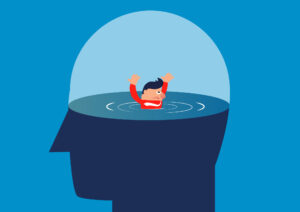If you are one of the millions of people who suffer from OCD, you know how debilitating it can be. The intrusive thoughts and compulsive behaviors can keep you from living a normal life. Until recently, there were not many treatment options available for OCD sufferers. But now there is a new treatment option that is very effective – Cognitive Behavioral Therapy (CBT). In this blog post, we will discuss what CBT is and how it can help treat OCD.
Contents
What Is OCD?

OCD is an anxiety disorder that causes people to have intrusive thoughts and fears, which can lead to feelings of distress. A person with OCD is then compelled to perform particular rituals (or compulsions) to reduce anxiety. This can lead to a cycle of obsession, ritual, and relief that keeps the person stuck in a cycle of unhelpful behavior.
The reasons for OCD vary from person to person but can include genetics, trauma, or a combination of different factors. No matter the cause, OCD can be an incredibly disruptive condition that affects all aspects of someone’s life.
Fortunately, there is hope for those suffering from OCD. Cognitive Behavioral Therapy (CBT) is a type of psychotherapy that has been proven to be effective in treating OCD and its associated symptoms. It helps people to better understand their intrusive thoughts by learning how to recognize unhelpful patterns and then make changes in thought processes.
What is Cognitive Behavioral Therapy (CBT)?
Cognitive Behavioral Therapy (CBT) is a type of psychotherapy that focuses on changing unhelpful thoughts and behaviors. This type of therapy is very effective in treating OCD. Through CBT, people learn strategies to change their thought patterns, challenge irrational beliefs, and reduce the intensity of their obsessions and compulsions.
CBT makes use of both cognitive and behavioral interventions to help people with OCD manage their symptoms. Through this type of therapy, people learn to understand the connection between their thoughts and behaviors and how they can modify them to reduce symptoms.
How Does CBT Treatment Help with OCD?

CBT treatment can help people with OCD learn how to manage the symptoms of the disorder more healthily. During CBT sessions, individuals will work closely with their therapist to identify and modify negative thought patterns or behaviors that may be fueling their anxiety or compulsive behavior.
This treatment of OCD helps to encourage the patient to think in more helpful and realistic ways and also to challenge any irrational thoughts they may have. The goal of CBT is not only to help reduce OCD symptoms but also to give patients the tools they need to improve their quality of life and make positive changes that will last the long term.
CBT treatment can involve a range of different approaches, including cognitive restructuring, exposure therapy, behavioral activation, and relaxation techniques. Cognitive restructuring is when an individual work with a therapist to identify negative thought patterns and learn how to reframe them into healthier perspectives.
Different Techniques of CBT Treatment for OCD

Different techniques of cognitive behavioral therapy (CBT) are used to treat obsessive-compulsive disorder (OCD). These techniques help individuals gain insight into their thoughts and behaviors, and learn how to change them to improve their mental health.
Cognitive restructuring is a common technique used in CBT that helps an individual identify and challenge irrational beliefs or patterns of thinking that can lead to OCD symptoms. This can include questioning the accuracy of perceived threats, examining evidence for and against certain beliefs, and exploring alternative interpretations of events. By doing this, individuals can develop more reasonable expectations about themselves and the world around them.
Exposure and response prevention is another type of CBT technique that involves exposing oneself to situations or activities associated with one’s OCD triggers in a gradual, controlled way while teaching them to resist engaging in compulsive behavior. Through this method, individuals can learn how to face their fears and re-wire their reactions over time.
CBT also includes relaxation training, which teaches individuals how to use breathing exercises, progressive muscle relaxation, and other strategies for managing stress. Relaxation techniques are useful for reducing the severity of anxiety symptoms and providing a sense of calm during times of distress.
Finally, problem-solving is another CBT technique that helps individuals develop skills for effectively dealing with any problems or challenges they may encounter related to OCD. This includes breaking down complex tasks into manageable steps, identifying potential solutions for each step, evaluating each solution’s pros and cons, and making an informed decision about the best course of action.
CBT is a powerful tool that can help individuals with OCD manage their symptoms and find relief from their condition. With these techniques, individuals can gain control over their emotions and behaviors to lead healthier, happier lives.
Goal of CBT Treatment for OCD
The main goal of CBT treatment for OCD is to help individuals recognize, challenge, and ultimately change their distorted thoughts and behaviors that are causing distress. Cognitive behavioral therapy (CBT) enables people with OCD to understand the relationship between their thoughts, feelings, and behaviors so they can gain control over these aspects of their lives. By altering how an individual thinks about a situation or an intrusive thought, it can also reduce anxiety associated with it.
CBT helps individuals identify their dysfunctional beliefs about themselves, others, and the world around them that contribute to the development of OCD symptoms. It then teaches people how to construct more accurate evaluations and replace maladaptive thinking patterns with healthier cognitive habits.
The goal is for individuals to learn new ways of looking at situations and gradually practice them in their everyday lives. With the right kind of guidance, people can learn to challenge and modify their beliefs and behaviors that may be contributing to OCD symptoms. This will ultimately help them gain control over their thoughts, feelings, and behaviors so they can lead healthier and more fulfilling life.
Why Do People Prefer CBT Treatment for OCD?

People seek Cognitive Behavioral Therapy (CBT) as a treatment for Obsessive Compulsive Disorder (OCD) because it has been proven effective in reducing symptoms and improving the overall quality of life.
CBT is an evidence-based approach that helps individuals find better ways to manage their thoughts, emotions, and behaviors. This type of therapy focuses on helping people develop strategies to effectively address the challenges they experience with OCD. Through this process, patients learn how to identify irrational beliefs and modify them with logical thinking behavior.
One advantage of CBT treatment for OCD is its short-term nature. Unlike traditional psychotherapy which can last for years, CBT typically involves about twelve sessions over two or three months. During these sessions, therapists help patients identify the sources of their obsessive behavior and develop strategies for overcoming it. Patients may also be taught relaxation techniques, stress management skills, and how to engage in positive self-talk.
CBT treatment for OCD is also beneficial because it can help individuals gain better insight into why they behave the way they do. By understanding their thoughts, feelings, and behaviors, patients are better able to recognize patterns that lead to obsessive thinking and learn how to respond differently. This increased awareness often leads to improved decision-making skills and an overall decrease in symptoms over time.
Conclusion
CBT is an effective treatment for OCD that can help you break free from the cycle of obsessing and compulsions. With the right approach and support, you can learn to manage your symptoms and gain back control over your life. It is important to remember that it takes time to see results from this type of treatment, so be patient with yourself as you take steps toward recovery.
The goal is not just to reduce your symptoms but to also increase functioning in all areas of life. If you or someone you know are struggling with OCD, reach out for professional help today and start on the path to greater mental health and well-being.
For more information and guidance, please contact OCDMantra. OCD is a mental health disorder characterized by obsessions and compulsions. If you have any queries regarding OCD treatment, ERP therapy experienced therapists at OCDMantra can help: Book a trial OD therapy session.


